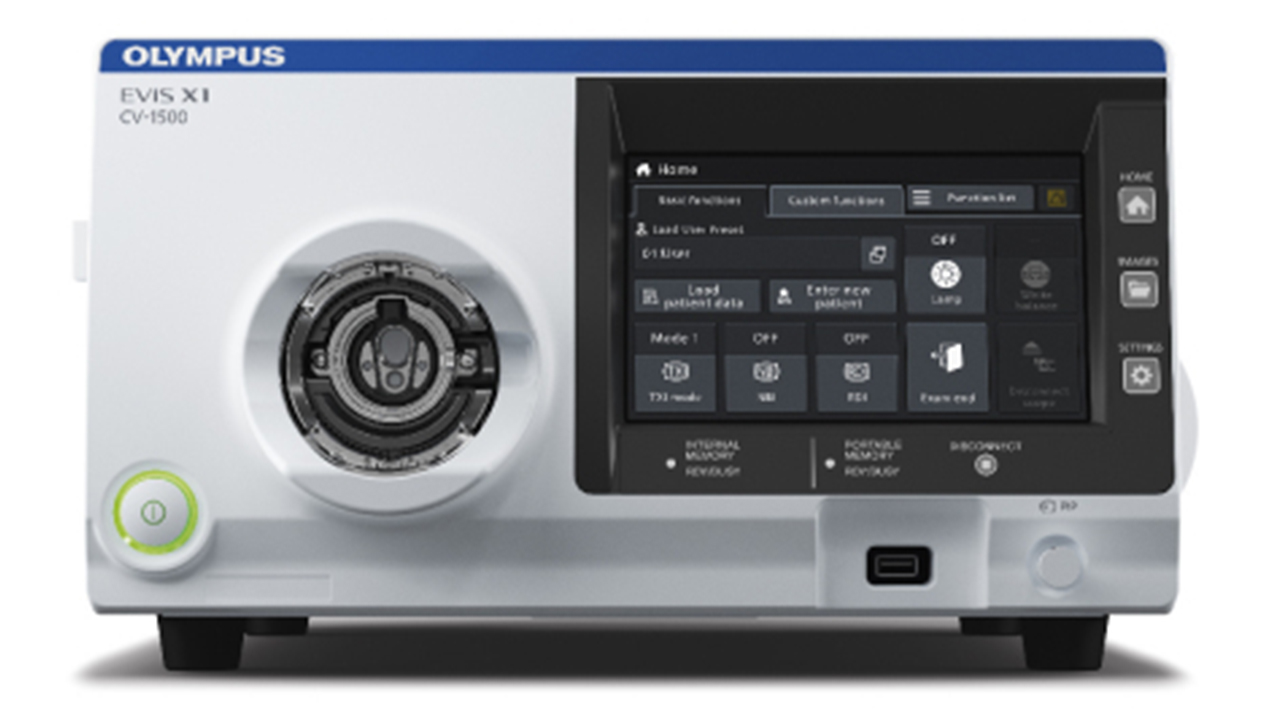Olympus Corporation (President: Yasuo Takeuchi) today announced the launch of EVIS X1, its most advanced endoscopy system to date. The new system is to improve outcomes from disorders of the stomach, colon, and oesophagus, as well as from bronchial diseases, by providing every endoscopist with innovative and proven tools. The launch of EVIS X1 further strengthens Olympus’ leadership in endoscopy and continued medical focus.
EVIS X1 supports accurate screening and confident diagnosis through introducing new and easy-to-use technologies to support how gastrointestinal disorders, such as colorectal cancer (CRC), or bronchial diseases are detected, characterized and treated. These include Extended Depth of Field (EDOF), Red Dichromatic Imaging (RDI), Texture and Color Enhancement Imaging (TXI) as well as the already known and proven Narrow Band Imaging (NBI). Being committed to innovation, Olympus is also already developing future technologies – in particular featuring artificial intelligence (AI).
“EVIS X1 is the latest innovation to build on our 100-year legacy of world-leading innovation and quality,” said Frank Drewalowski, Head of Endoscopic Solutions Division, Olympus Corporation. “We are proud that, with EVIS X1, we can support endoscopists around the world and help to elevate the standard of endoscopy across the board.”
Combining knowledge, experience and innovation in one endoscopic system
The key features of the EVIS X1 system include:
Extended Depth of Field (EDOF): EDOF combines two images at different focal lengths into one perfect image to help aid diagnosis and confident decision-making. It delivers observational excellence through continuous broad focus and seamless magnification. At the same time, the established Dual Focus function provides high magnification, which can be activated by the push of a button. This improved visibility and continuously sharp image has been developed to reduce the necessity for focal adjustments and could improve efficiency and decrease the oversight rate.
Red Dichromatic Imaging (RDI): Gastrointestinal bleeding is a serious challenge, potentially involving considerable mortality and management costs. RDI enhances the visibility of deep blood vessels and GI bleeding sources, thereby helping to identify blood vessels that could require immediate treatment. It utilizes green, amber and red wavelengths to visualize deep blood vessels. Easier identification of bleeding spots makes hemostasis quicker and easier whilst potentially improving the efficiency of any corresponding treatment. This minimally invasive technology could also help reduce physician stress during endoscopic therapy.
Texture and Color Enhancement Imaging (TXI): TXI supports better visibility of potential and extant lesions (such as areas of inflammation, flat or depressed lesions, or even tiny precursor lesions) through enhancing texture, brightness and color to define subtle tissue differences more clearly. With its advanced imaging technology, TXI holds the potential to reinvent white light in endoscopy. By supporting better visibility of potential and extant lesions, TXI aims to contribute to higher detection rates and improve qualitative diagnosis.
Narrow Band Imaging (NBI): NBI is an already known, powerful and proven optical technology that allows for a high-confidence optical diagnosis through the creation of a strong contrast between vessels and surrounding mucosa. It utilizes specific blue and green wavelengths. NBI not only supports earlier detection of any lesions but also provides a more detailed, higher-contrasted visualization and thus improves qualitative diagnosis.
Being ready for the future
The next upcoming feature of the EVIS X1 system will be AI. Olympus is developing innovative new ways to integrate breakthroughs in deep learning into the world of image detection, characterization, staging, and treatment.
Beyond introducing new features, EVIS X1 also provides newly established cross-compatibility between two formerly separate systems: EVIS LUCERA ELITE and EVIS EXERA III. This means that Olympus’ existing range of products can be combined to provide an extended portfolio of endoscopes for special procedures – expanding the possibilities for endoscopists.
Focusing on colorectal cancer prevention
Especially by helping to facilitate screening and early detection of abnormalities in the gastrointestinal tract, EVIS X1 could play a major role in the prevention of colorectal cancer (CRC). In 2018, there were 1.80 million cases of colorectal cancer and 862,000 patient deaths worldwide.i It is also expected that the global burden of CRC will increase substantially by 2030.ii For every 1% increase in adenoma detection rate (ADR), there is a 3% decrease in CRC risk.iii
“Early detection and diagnosis is critical for CRC prevention,” said Prof. Michal F. Kaminski, Professor at the National Research Institute of Oncology in Warsaw. “EVIS X1 is intuitive and gives endoscopists a range of innovative and proven tools to carry out minimally invasive, precise and effective procedures – enabling them to make truly-informed diagnostic and treatment decisions in the best interest of their patients. Among the new technologies especially TXI looks promising. It seems to provide more information to the endoscopist while maintaining a close to white light appearance. This will make it very easy to adapt to it.”
Reaffirming leadership in endoscopy
EVIS X1 is not only anticipated to serve healthcare professionals, hospital management and patients around the world but also follows Olympus’ implementation of its strategy. “Our purpose is to make people’s lives healthier, safer and more fulfilling,” said Takaharu Yamada, Vice President, GI Endoscopy Business, Global, Olympus Corporation. “This launch also strengthens our global leadership in endoscopy and follows our focus of the corporate portfolio centering on the medical business.”
EVIS X1 is initially being launched in EMEA (Europe, Middle East & Africa), Australia, India and Hong Kong. It is manufactured by Olympus Medical Systems Corporation. The company and product names specified in this release are the trademarks or registered trademarks of Olympus.

 EVIS X1 supports accurate screening and confident diagnosis through introducing new and easy-to-use technologies to support how gastrointestinal disorders, such as colorectal cancer (CRC), or bronchial diseases are detected, characterized and treated.
EVIS X1 supports accurate screening and confident diagnosis through introducing new and easy-to-use technologies to support how gastrointestinal disorders, such as colorectal cancer (CRC), or bronchial diseases are detected, characterized and treated. 










.jpeg)











.jpg)








